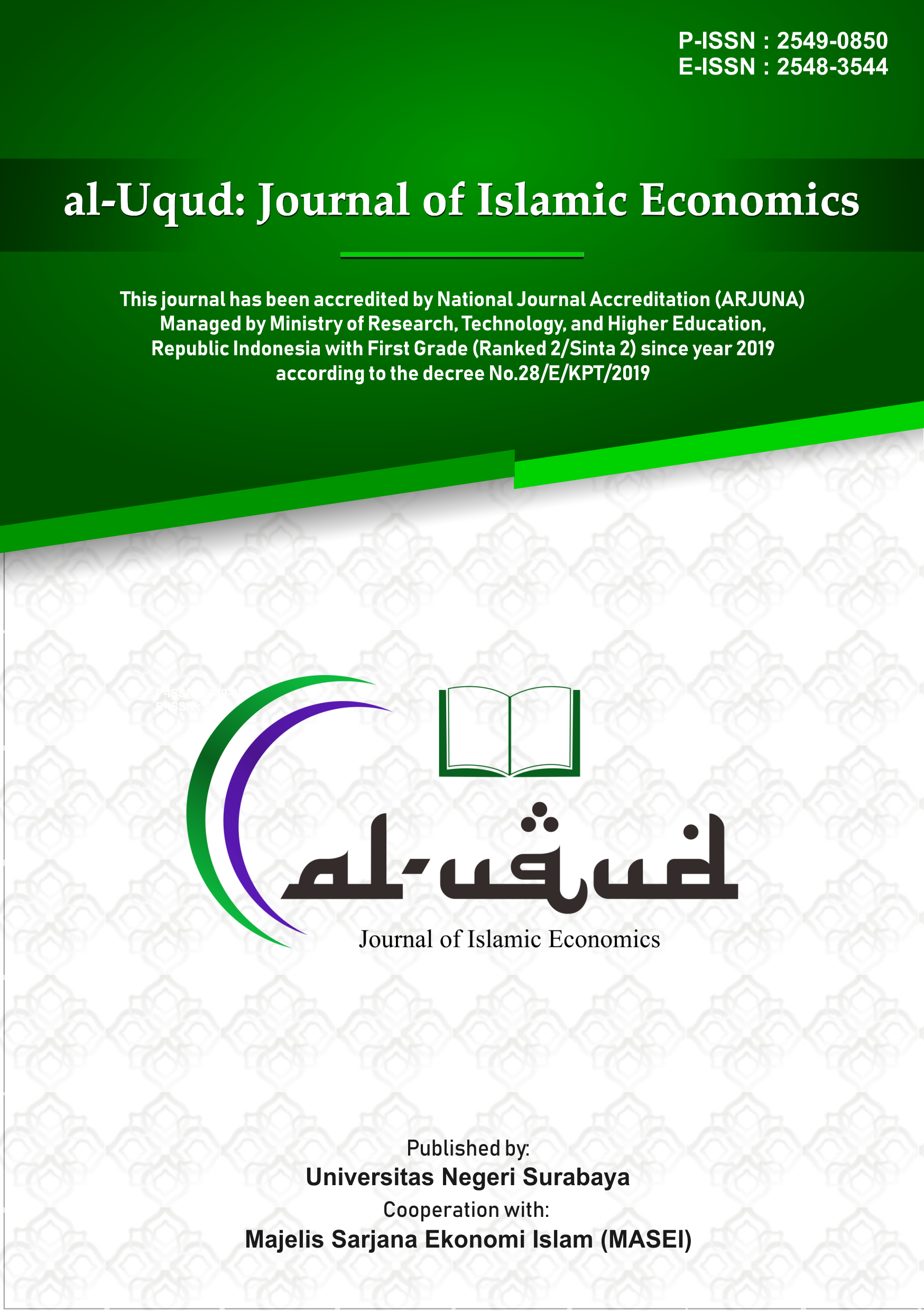Survival of Traditional Retailers: An Islamic Business Perspective
DOI:
https://doi.org/10.26740/al-uqud.v4n1.p18-31Keywords:
Traditional retail store, Modern retail stores, Survival mechanism, Defender strategy, Islamic perspective.Abstract
This study aimed to explain the reality of survival mechanisms and adaptive strategies by traditional retailers in Surabaya in facing the existence of massive modern retail stores. This study used qualitative research with a phenomenological approach. The data collection method used observation and interview techniques. Data analyzed with Clark and Scott's survival mechanism theory and the adaptive strategy by Miles and Snow. The result of this research was in the aspect of defender strategy, traditional retailers did various strategies when prices went up, and instead of increased the prices they choosed to reduce the profits. The stores equipped with people daily needs to retain customers. Even though the stock was small, the items sold were complete. It was important to promote family relations with buyers. A striking aspect is the close family relation that was so different from modern retail stores. In the aspect of reactor strategy, the owners responded to the situation without having a long-term strategy design. Their stores responses were reactive and short-term oriented in the form of selling goods by following the tastes of buyers and current trends. Meanwhile, in carrying out business performance in connection with the survival mechanism, Surabaya traditional retailers met the business assessment of the Islamic perspective namely on the aspects of material, mental, spiritual, and fraternal.
References
Anupam, D., Vinod, K. & Saha, G.C. (2010). Retail service quality in context of CIS countries. International Journal of Quality & Reliability Management, 27(6), 658-683. https://doi.org/10.1108/02656711011054542
Alase, A. (2017). The interpretative phenomenological analysis (IPA): A guide to a good qualitative research approach. International Journal of Education and Literacy Studies, 5(2), 9-19. http://dx.doi.org/10.7575/aiac.ijels.v.5n.2p.9
Ashworth, C. J. (2012). Marketing and organisational development in e-SMEs: Understanding survival and sustainability in growth-oriented and comfort-zone pure-play enterprises in the fashion retail industry. International Entrepreneurship and Management Journal, 8(2), 165-201. http://doi.org/10.1007/s11365-011-0171-6
Balog, A. M., Baker, L. T., & Walker, A. G. (2014). Religiosity and spirituality in entrepreneurship: a review and research agenda. Journal of management, spirituality & religion, 11(2), 159-186. https://doi.org/10.1080/14766086.2013.836127
Blackmore, K., & Nesbitt, K. (2013). Verifying the Miles and Snow strategy types in Australian small-and medium-size enterprises. Australian Journal of Management, 38(1), 171-190. https://doi.org/10.1177/0312896212444692
Boyd, N. E., & Kurov, A. (2012). Trader survival: evidence from the energy futures markets. Journal of Futures Markets, 32(9), 809-836. https://doi.org/10.1002/fut.20543
Clark, G. (2019). Traders versus the state: anthropological approaches to unofficial economies. Routledge.
Dinkominfo of Surabaya. (2018). Minimarket Surabaya dalam Data. https://dinkominfo.surabaya.go.id/index.php?pages=detail_berita&id_berita=279
Disperdagin. (2019). http://disperdagin.surabaya.go.id/disdag/2019/01/16/pelepasan-mahasiswa-kkn-uinsa-untuk-toko-kelontong/
Gros, A. E. (2017). Alfred Schutz on phenomenological psychology and transcendental phenomenology. Journal of Phenomenological Psychology, 48(2), 214-239. https://doi.org/10.1163/15691624-12341329
Hayati, K., & Caniago, I. (2012). Islamic work ethic: The role of intrinsic motivation, job satisfaction, organizational commitment and job performance. Procedia-Social and Behavioral Sciences, 65, 1102-1106. https://doi.org/10.1016/j.sbspro.2014.05.148
Hoque, N., Mamun, A., & Mohammad Ahshanul Mamun, A. (2014). Dynamics and traits of entrepreneurship: an Islamic approach. World Journal of Entrepreneurship, Management and Sustainable Development, 10(2), 128-142. https://doi.org/10.1108/WJEMSD-04-2013-0027
Javed, B., Bashir, S., Rawwas, M. Y., & Arjoon, S. (2017). Islamic Work Ethic, innovative work behaviour, and adaptive performance: the mediating mechanism and an interacting effect. Current Issues in Tourism, 20(6), 647-663. https://doi.org/10.1080/13683500.2016.1171830
Permendag. (2013). https://search.hukumonline.com/?query=Peraturan%20Menteri%20Perdagangan%20%20Nomor%2070%20tahun%202013%20
Prabowo, F. S., & Rahadi, R. A. (2015). David vs. Goliath: Uncovering The Future of Traditional Markets in Indonesia. Mediterranean Journal of Social Sciences, 6(5), 28. http://dx.doi.org/10.5901/mjss.2015.v6n5p28
Quran Karim. https://litequran.net/al-jumuah
Randall, R. M. (2015). W. Chan Kim and Renée Mauborgne dispel blue ocean myths. Strategy & Leadership, 43(2), 11-14. https://doi.org/10.1108/SL-01-2015-0007
Ringwald, K., & Parfitt, S. (2011). Is reflective practice the key to survival for small independent retailers? Evidence from South-East Wales. Reflective Practice, 12(5), 585-598. https://doi.org/10.1080/14623943.2011.601558
Sunanto, Sandra. (2012). Modern Retail Impact on Store Preference and Traditional Retailers in West Java. AJBR A Journal about Business in Asia and Beyond. 3 (1-2). https://magscholar.com/asian-journal-of-business-research/archived-issues/ajbr-vol-3-issue-1-2/doi-10-14707ajbr-120007/
Schipmann, C., & Qaim, M. (2011). Modern food retailers and traditional markets in developing countries: comparing quality, prices, and competition strategies in Thailand. Applied Economic Perspectives and Policy, 33(3), 345-362. https://doi.org/10.22004/ag.econ.108348
Scott, J. C. (2010). The art of not being governed: An anarchist history of upland Southeast Asia. Nus Press.
Tracy, S. J., & Hinrichs, M. M. (2017). Big tent criteria for qualitative quality. The International Encyclopedia of Communication Research Methods, 1-10. https://doi.org/10.1002/9781118901731.iecrm0016
Usman, M., Shahzad, K., & Khan, K. (2015). Islamic Work Ethics (IWE): A review of litrature and directions for future research. Journal of Islamic Business and Management, 219(3327), 1-28. https://jibm.org/archieves/volume5-issue2/volume5-issue2-article6/
Wahab, K. A., & Rafiki, A. (2014). Measuring small firm entrepreneur's performance based on Al-Falah. World Applied Sciences Journal, 29(12), 1532-1539. http://www.idosi.org/wasj/wasj29(12)14/7.pdf
Willis, D. G., Sullivan-Bolyai, S., Knafl, K., & Cohen, M. Z. (2016). Distinguishing features and similarities between descriptive phenomenological and qualitative description research. Western journal of nursing research, 38(9), 1185-1204. https://doi.org/10.1177/0193945916645499
Downloads
Published
How to Cite
Issue
Section
License
CC BY 4.0 Abstract views: 928
,
Abstract views: 928
, PDF Downloads: 720
PDF Downloads: 720








